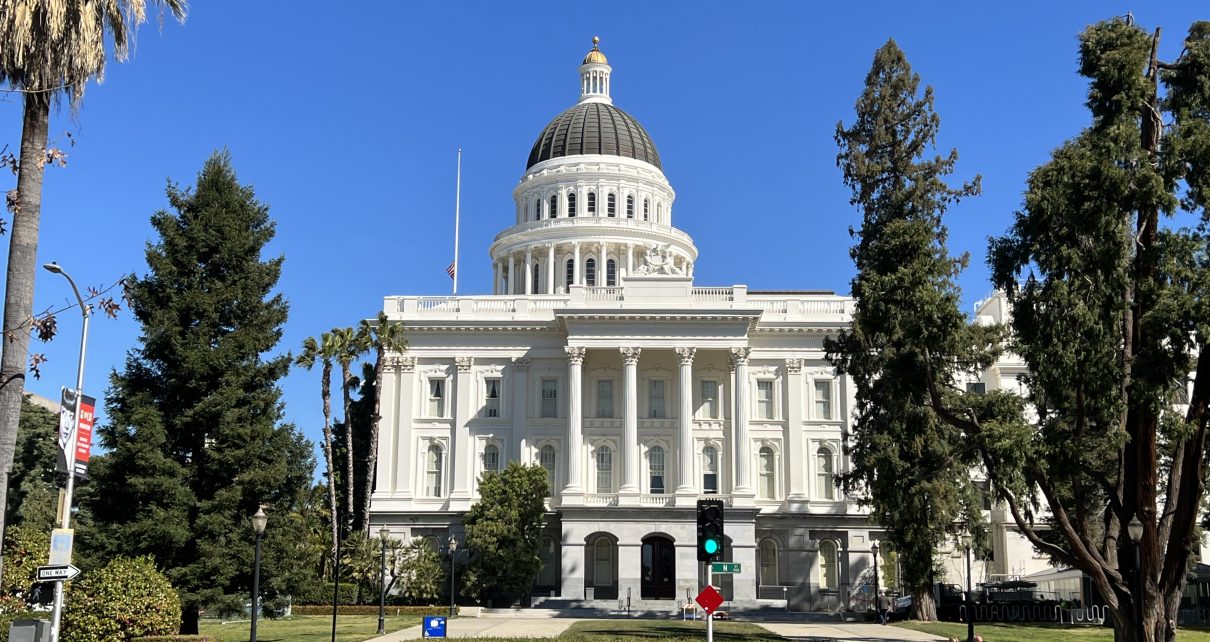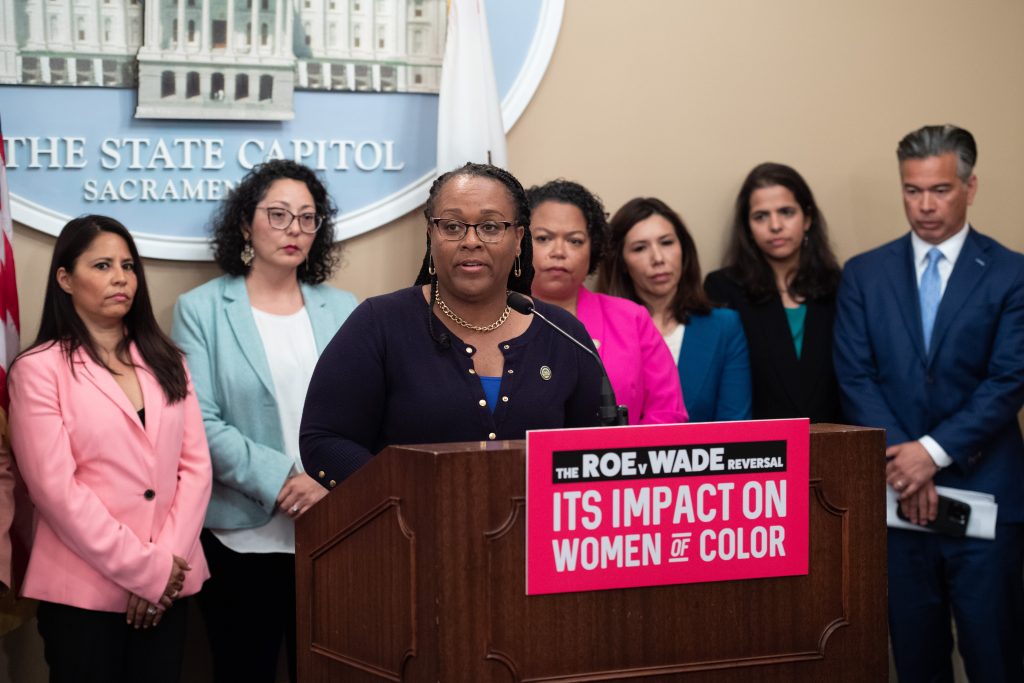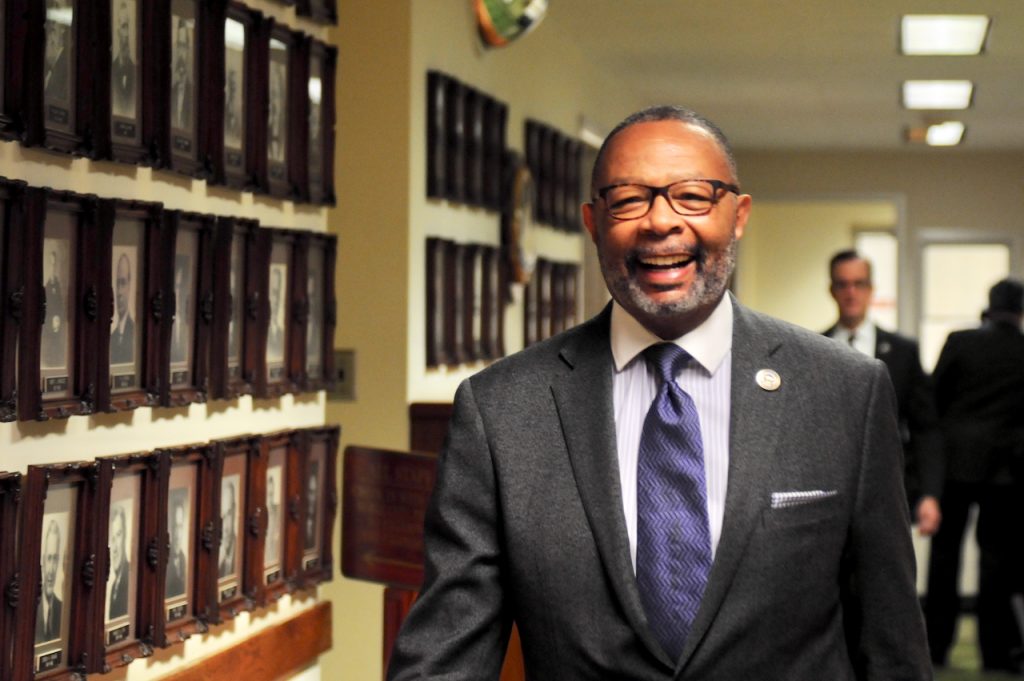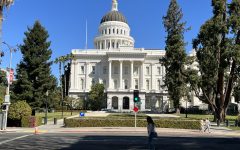
California State Capitol on March 11, 2022. (Photo: Kevin Sanders for California Globe).
Legislative Black Caucus Unveils 14 Reparations Bills for 2024
No direct cash payment bills were introduced due to state budget issues, severe unpopularity
By Evan Symon, February 1, 2024 1:01 pm
The California Legislative Black Caucus announced on Wednesday they will be introducing 14 reparations bills this year in the legislature, all while avoiding giving out direct cash payments because of a severe lack of popularity in both the Legislature and amongst residents for them.
From late 2020 to June of 2023, the California Reparations Task Force had a long, controversial road to a final report. While initially encompassing all people of African descent, the group of those qualified to receive reparations was significantly narrowed in March 2022 when the task force voted to limit the possible reparations to those who are an African American descendant of an enslaved person or free Black person living in the US prior to the end of the 19th century.
In June 2022 the Task Force released its first report, giving a recommendation of reparations, in the form of home buying assistance, free college tuition, and business grants. However, one of the many criticisms against the report recommendations was that no estimated monetary figure was attached. In early December, an estimate of $569 billion was provided by the state, leading to disbelief and the threat of lawsuits if the number holds. Later that month, compensation compensation and eligibility requirements were discussed.
In early 2023, with the state facing a major budget deficit, a new compensation plan totaling $800 billion was released. However, that plan received stark opposition, with so many opposing the $800 billion compensation plan approved by the Task Force in May that Task Force members came out and said “STOP focusing on the monetary part of the plan.” Another figure of $1.2 million given to each black resident was also scrutinized.

The Task Force subsequently had to scramble, as even Governor Gavin Newsom came out in opposition of cash payments. In June, the final list of recommendations came out, giving out dozens of points ranging from bringing back affirmative action in colleges (Despite a Supreme Court ruling making it impossible), and funding mental health programs for African-Americans, to removing the need to show I.D. to vote and Fund African American banks. As both Assemblymembers and Senators worked on crafting bills, more warnings to not give any cash payments came in from lawmakers as well as Californians, with around 6 in 10 Californians opposing cash payments.
This led to the CLBC announcement on Wednesday that 14 reparations bills will be introduced this year, covering areas such as education, civil rights, criminal justice, health and business. However, because of the unpopularity of cash payments and the current $68 billion budget deficit, direct cash payments will not be amongst the bills this year, with some in the caucus hoping that such legislation could be brought forward in the coming years.
“While many only associate direct cash payments with reparations, the true meaning of the word, to repair, involves much more,” said Assemblywoman Lori Wilson (D-Suisun City) in a statement. “We need a comprehensive approach to dismantling the legacy of slavery and systemic racism.”
“We started realizing with the budget environment we were going to have to do more systemic policy change to address systemic racism versus big budget asks because there just wasn’t the budget for it. Our priorities centered around policy changes or creating opportunities. The Caucus’ first step will be to introduce a resolution that recognizes that harm and a subsequent bill that requests a formal apology by the Governor and the Legislature for the role that the State played in the human rights violation and crimes against humanity on African Slaves and their descendants.”
The proposed bills
According to a press release by the CLBC, the 14 reparations-related bills under the “2024 Reparations Priority Bill Package” banner are as follows, with several not having numbers yet due to not being formally introduced or properly being fleshed out:
Education
- AB 1929 (McKinnor) – Expand access to career technical education by creating a competitive grant program to increase enrollment of descendants in STEM-related CTE programs at the high school and college levels.
- AB XXX (McCarty) – Career Education Financial Aid for redlined communities
Civil Rights
- ACA 7 (Jackson) – Amends the California Constitution to allow the State to fund programs for the purpose of increasing the life expectancy of, improving educational outcomes for, or lifting out of poverty specific groups.
- ACR 135 (Weber) – Formally recognizes and accepts responsibility for all of the harms and atrocities committed by representatives of the state who promoted, facilitated, enforced and permitted the institution of chattel slavery.
- AB 1815 (Weber) – Prohibit discrimination based on natural and protective hairstyles in all competitive sports by extending the CROWN Act to explicitly include competitive sports within California.
- SB XXX (Bradford) – Property takings: Restore property taken during race-based uses of eminent domain to its original owners or provide another effective remedy where appropriate, such as restitution or compensation.
- AB XXX (Jones-Sawyer) – Issues a formal apology for human rights violations and crimes against humanity on African slaves and their descendants.
Criminal Justice Reform
- ACA 8 (Wilson) – Amend the California Constitution to prohibit involuntary servitude for incarcerated persons.
- AB 1986 (Bryan) – Eliminate the CDCR practice of banning books without oversight and review.
- AB XXX (Jones-Sawyer) – Fund community-driven solutions to decrease community violence at the family, school and neighborhood levels in African-American communities by establishing a state-funded grant program.
- AB XXX (Holden) – Mandela Act: Restricts solitary confinement within CDCR detention facilities.
Health
- AB 1975 (Bonta) – Make medically supportive food and nutrition interventions, when deemed medically necessary by healthcare providers, a permanent part of Medi-Cal benefits in California.
- SB XXX (Smallwood-Cuevas) – Address food injustice by requiring advance notification to community stakeholders prior to the closure of a grocery store in underserved or at-risk communities.
Business
- AB XXX (Gipson) – Eliminate barriers to licensure for people with criminal records. Expansion of AB 2138 to prioritize African American applicants seeking occupational licenses, especially those who are descendants.

“We will endeavor to right the wrongs committed against black communities through laws and policies designed to restrict and alienate African Americans,” added Assemblyman Reggie Jones-Sawyer (D-Los Angeles). “These atrocities are found in education, access to homeownership, and to capital for small business startups, all of which contributed to the denial of generational wealth over hundreds of years. As a member of the Reparations Taskforce, I am proud of the two-year study that resulted in two separate reports totaling over 1,600 pages. These reports contain the most comprehensive empirical data and historical evidence ever collected on the issue of chattel slavery. There is no doubt about the far-reaching negative impacts of bigoted laws born from the end of slavery in our country.
“Hundreds of legislative and budgetary reparatory recommendations were made within the final report and I, along with the members of the Black Caucus, look forward to working with our legislative colleagues to achieve true reparations and justice for all black Californians.”
Most reparations bills face major challenges
However, experts told the Globe on Thursday that only a few of the bills will likely be passed outright, because of many legal issues already becoming apparent in the proposed bills.
“Going down the list, most can be held up in court with the right lawyers behind them,” explained Legal adviser Richard Weaver to the Globe on Thursday. “Keep in mind, I’m going off of what some of the descriptions are since they haven’t had the full bill come out, but safe to say that a lot of them are worrisome.
“Some look like they’ll pass. AB 1815 for example, the hairstyles one. As long as it doesn’t go against safety regulations, like having longer hair that can be used as a way to easily grab onto an opponent or something like that that can cause injury, I think that is a pretty safe one. But some are kind of discriminatory and go against current laws. Like AB 1929. That’s giving benefits to a certain race only, so that is a huge legal trap right there. A lot of school districts will also raise hell, as it goes against being merit-based for grants.
“ACA 7 is a huge ticking time bomb waiting to happen too. Read it. It says “Amends the California Constitution to allow the State to fund programs for the purpose of increasing the life expectancy of, improving educational outcomes for, or lifting out of poverty specific groups.” That’s affirmative action, something that Californian voters have routinely shut down and that is now legally dubious thanks to Students for Fair Admissions v. Harvard last year in the Supreme Court. Those are two way big hurdles that is not going to have it go anywhere.
“I mean, the haircuts, the apologies, the supermarket one, and maybe a few others can make it this year. Several are not so great legally speaking. Others, the costs of them will be a lot in a year where we need a lower budget so many lawmakers on both sides will be very hesitant to boost spending anywhere. And others, even if they pass, you can see the lawsuits sprouting up already. I know for a fact that there are several legal groups looking at the prison bills ready to pounce on them should they pass. A big problem is that a lot of these bills just don’t have the full details yet, so maybe some will improve. Probably not, but it would be fair to read the full bill first before judging. Surface level though, most of these have major flaws and issues.
“This is just the first wave of reparations bills, and how well they do will be pretty telling on where they will go from here. Remember, these are just easing the legislature into these kinds of bills. If many pass and aren’t challenged in court or by voters, they’ll go for more riskier bills, including maybe those cash payments. This will be a very interesting session.”
More on the reparations bills, including the release of full bills, is to come out soon.
- San Diego Country Supervisor Jim Desmond Calls San Diego New Epicenter Of Illegal Crossings By Migrants - April 27, 2024
- Oracle Moving Headquarters Out Of Austin Only 4 Years After Moving Out Of California - April 26, 2024
- Congressman Adam Schiff Robbed of his Luggage in San Francisco Car Break In - April 26, 2024





It’s ironic that Democrat Assemblywoman Lori Wilson and California’s Democrat super-majority Legislature are moving full-steam ahead with reparations for black descendants of slaves when it was Democrats who instituted slavery, segregation, Jim Crow laws and the KKK? The history of the Democrat party has gotten in their way so they’ve tried to rewrite history to make it fit into their current reparations narrative? Maybe it’s time they and other Democrats pay for the sins of their Democrat predecessors?
Seems like a slight conflict of interest to me.
So a few of these laws are nothing more than empty virtue signals. The rest give preferential treatment to a class of people based on their race which is flagrantly anti-constitutional. Gonna laugh when these laws are quietly ignored or shot down in the courts.
The lawless criminal Democrat mafia are all about ignoring the Constitution and any laws that get in their way?
Gimme my free stuff x 14.
Vote ALL THESE RACIST FOOLS OUT OF OFFICE in 2024. No taxpayer subsidies based on race. And what was listed as “Criminal Justice Reform” above is nothing but hoodlum appeasement and coddling. Typical of democrat legislation on the matter.